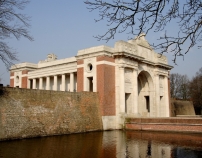| First Name: | Vincent | Last Name: | CAVE | |
|---|---|---|---|---|
| Date of Death: | 08/05/1915 | Lived/Born In: | Cricklewood | |
| Rank: | Company Sergeant Major | Unit: | London12 | |
| Memorial Site: | Menin Gate, Ypres | |||
Current Information:Age-37 Born-Marylebone The action fought by 12th London or the Rangers as they were known, on 8th May 1915 at Frezenberg Ridge was described in the Official History of the war as one of the heroic episodes of the conflict. Heroic it may have been but it cost the Rangers dear and they came out of it with only 53 men left standing. They had arrived in France on Christmas Day 1914 and soon joined 84 Brigade of 28th Division. In April 1915 the Germans, using gas for the first time, launched an all out attack on the salient around the Belgian town of Ypres. It became a gargantuan struggle that lasted well into the next month and at the end of it, the salient, though drastically reduced, still stood. The name is deceptive because the Frezenberg ridge, which lay to the north-east of the town rose to only 50 metres above sea level and was one of a series of low ridges that ran in a generally westerly direction and branched off the main ridge that ran north-easterly from Kemmel to Passchendaele. Nevertheless, it gave a commanding view down on to the town of Ypres and for that reason it was strategically important. Five days earlier the Rangers had been sent to dig the trenches on Frezenberg ridge whilst the front line was still further forward, around the village of Zonnebeke, But the following night a planned withdrawal took place and these new trenches, only 3 feet deep, became the new front line. The Rangers held this new position until the night of 7th May at which time they were relieved and went back to dug-outs behind the GHQ line. The next morning all hell broke loose. The Germans had had three days in which to bring up their artillery and range it on the new British positions, including the hastily dug trenches on the Frezenberg ridge. At 6am they opened up and 12th London, even though they were in dug-outs behind the GHQ line, were not immune to the terrific bombardment of the German guns and began taking casualties straight away. It was much more desperate for the battalions in the front line who were taking a terrific pounding and although they managed to repel the initial German infantry attacks, they were always in danger of being surrounded and cut off. At 11.15am 12th London were ordered forward to support the 1st Monmouth in this front line. A, B and C companies led this advance but first they had to pass through gaps in the wire in front of the GHQ line, German machine guns were trained on these gaps and many of the Rangers got no further than this point. Those who survived this first ordeal then had to advance 200-300 yards across ground which was being heavily shelled and which was alive with German rifle and machine gun bullets. Many fell but others reached the line. The Germans were so surprised by the audacity of this attack that they assumed that it had been made by fresh troops with strong support behind them. Consequently they themselves dug in and did not continue with their attack that day. If they had known that the Rangers were practically the last remaining troops between them and Ypres they would surely have pressed on. The exhausted remnants of 12th London spent two more days in these positions before being withdrawn. By the end of the Battle of Frezenberg Ridge, the British had been pushed back so that the GHQ line was now the front line, but Ypres was saved. |
||||
| « Back to Search Results | ||||
| If you think any of the information shown here is incorrect, Click Here to submit your amends and comments | ||||




